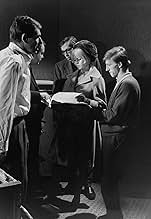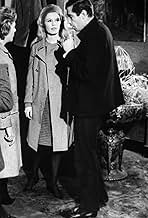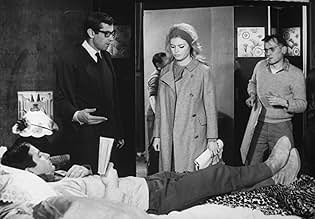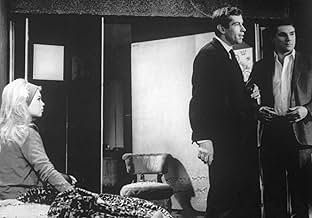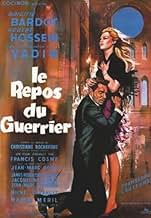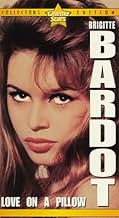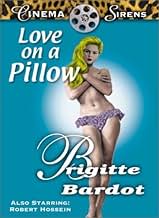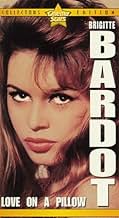Une jeune fille sauve un homme d'une tentative de suicide. Il s'avère être un sociopathe, qui commence à prendre le contrôle de sa vie, la maltraitant verbalement et émotionnellement, mais e... Tout lireUne jeune fille sauve un homme d'une tentative de suicide. Il s'avère être un sociopathe, qui commence à prendre le contrôle de sa vie, la maltraitant verbalement et émotionnellement, mais elle ne semble pas pouvoir se détacher de lui.Une jeune fille sauve un homme d'une tentative de suicide. Il s'avère être un sociopathe, qui commence à prendre le contrôle de sa vie, la maltraitant verbalement et émotionnellement, mais elle ne semble pas pouvoir se détacher de lui.
- Réalisation
- Scénario
- Casting principal
- Raphaële
- (as Macha Meril)
- Katov
- (voix)
- Le patron de l'hôtel
- (non crédité)
- Madame Pia - la concierge
- (non crédité)
- Armand
- (non crédité)
- Le gros serveur
- (non crédité)
- Le vieil homme dans le train
- (non crédité)
Avis à la une
For what it's worth, it tells of a bourgeois girl (Bardot) shortly to be married to an unassuming young man travelling from Paris to Dijon to hear the will of her late aunt, who accidentally stumbles on the suicide attempt of a bohemian, pulp-thriller-loving misanthrope (Robert Hossein) who, upon recovering, literally turns her life upside down. The cast is completed by James Robertson Justice (as Hossein's sculptor friend), Macha Meril (as Robertson's tramp companion) and, in one sequence, Michel Serrault as a notary.
In the end, the original title of THE WARRIOR'S REST sounds far more interesting that what's on offer here and the fact that I was misinformed about the film's running time I thought it was a good 22 minutes shorter! did not help to earn it much affection from my end. But, then, the sight of Bardot in her prime (and, Vadim being Vadim, in various stages of undress as well) is always welcome...
However, I detected one scene that may unite appreciators and non-appreciators. Its jazz-tune, somewhere halfway this movie, really is very good.
All in all a movie with an unususal thin story, even for Bardot-standards. That may be inspired by the Italian Fellini/Antonioni-movies, whcih were very fashionable in 1962. If 'repos' provides us with any theme, it's about the battle of the sexes. Brigitte comes out victorious: a foregone conclusion, given the nitwit-character of her male counterpart.
So even the most forbearing cinephiles surrender after half hour of everlasting misery, so upon these topics singled out above last night I'd to give up in those slow pace-agonizing experience ever had in BB's cinematography enforced by her former husband Roger Vadin in a lousy screenplay, to worsen the pseudo intellectual director imposes several losers characters on the boring narrative, so the extra-pissed viewers forsakes it checking out the time and making something meanwhile the picture reaching to the end.
Thanks for reading.
Resume:
First watch: 2025 / How many: 1 / Source: DVD / Rating: 5.
One would think he would be grateful and perhaps fall in love with his beautiful benefactress. What happens is just the opposite. She falls into a kind of obsessive, almost masochistic, love with him, but all he feels for her is indifference. He spends her money, drinks to excess, abuses her verbally and emotionally. But she can't let him go regardless of what he does. Yes, this is a familiar premise, and frankly I would not have stuck around long enough to see how it plays out except for Brigitte Bardot.
If you haven't seen her, you might want to watch this just to take a look at her. She is strikingly beautiful and amazingly sexy. She has pretty, almost perfect features and a soft and sweet way about her; but perhaps the most arresting thing about her is her figure. It is absolutely exquisite. She was a sensation in the fifties not only in France but in the US as the quintessence of the "sex kitten," in some ways even more so than, say, Marilyn Monroe or Tuesday Weld.
Roger Vadim, who would later direct Jane Fonda in Barbarella (1968) was married to Bardot at the time this movie was made. (He would later marry Jane Fonda.) Like some other French directors, Vadim liked to make movies which amounted to adorations of the beautiful young star. See Roman Polanski with, e.g., Nastassja Kinski in Tess (1979); Krzysztof Kieslowski with Irene Jacob in La Double vie de Véronique (1991) and Trois couleurs: Rouge (1994); and Andre Techine, with Juliette Binoche in Rendez-vous (1985) for some comparisons. Naturally if you make movies in which the camera adores the young actress and shows her in her best light, you are going to attract young actresses! Here Vadim directs in a studied manner designed to not only show off Bardot's exquisite beauty but to highlight her ability as an actress. Although not among the first rank as actresses go, Bardot performs well here. Perhaps this is her best film. She is elegantly dressed and coiffured, and Vadim treats us to many close ups of her lovely face. (If there is a more beautiful woman in filmdom, I haven't seen her.) But don't expect to see much of her equally lovely body or any kinky sex. This film could easily pass for PG-13.
Vadim creates an early sixties French atmosphere as he recalls the jazz/beat scene from that era, but he does so in a superficial, almost euphemistic way. In the elaborate scenes at Katov's apartment and then at his estate, we are given a hint of the decadent indulgence of a certain class of French society in which privilege, jazz, heroin, pot and easy sex are the rule, but Vadim keeps it all off camera except for one scene in which a joint is passed around.
Vadim's most famous film starring Brigitte Bardot is Et Dieu... créa la femme (And God Created Woman) (1956). This is not to be confused with Vadim's American version of the film from 1988 starring Rebecca De Mornay, which was not very good.
Bardot retired fairly young and devoted her life to helping animals.
(Note: Over 500 of my movie reviews are now available in my book "Cut to the Chaise Lounge or I Can't Believe I Swallowed the Remote!" Get it at Amazon!)
Le saviez-vous
- AnecdotesThe encore for this film, composed by Michel Magne, was later used in 1968 by Frida Boccara in her single "Cent Mille Chansons". This version, now with lyrics, was written by Eddy Marnay.
- Citations
Renaud Sarti: Our lives on this earth are pointless.
Geneviève Le Theil: Speak for yourself.
Renaud Sarti: I am.
- ConnexionsFeatured in Le mystère Bardot (2012)
Meilleurs choix
- How long is Love on a Pillow?Alimenté par Alexa
Détails
- Durée1 heure 42 minutes
- Rapport de forme
- 2.35 : 1

